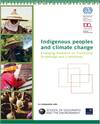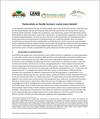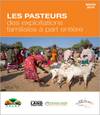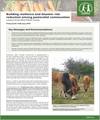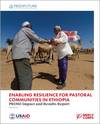Traditional knowledge of indigenous communities cuts across numerous aspects of sustainability and resilience. However, the practice of traditional knowledge is yet to be adequately understood, with many research gaps confronting policy-makers. An understanding of the interactions of traditional knowledge systems, rooted in indigenous ways of life, cultural approaches and traditional occupations is important. The transformations are being experienced in societies, economies, institutions, technologies and the climate. This publication is a collaboration between the ILO and the School of Geography and the Environment, University of Oxford, which draws on recent and emerging research conducted directly with communities across Asia and the Pacific, Africa, and the Americas. It aims at sharing experiences gained by researchers and the communities themselves with policy-makers and key stakeholders.
Year of publication: 2019Organization: Auteurs individuels, Organisation internationale du Travail
Topic: Changement climatique, Peuples autochtones, Résilience
Language: English
Type of document: Technique
Geographical coverage: Global
In the definition of family farmers for the International Year of Family Farmers (IYFF) in 2014 and now for the United Nations Decade of Family Farming 2019–28, pastoralists are mentioned as a group needing specific attention. Despite this recognition, most statements, papers and information about family farmers refer primarily to small-scale crop farmers. As organisations supporting, working with or representing pastoralists, we want to draw attention to the importance of including pastoralists within discussions and interventions in family farming, also within the Decade. Here, we outline: i) the features of pastoralists that identify them as family farmers; ii) the importance of pastoralists for the wellbeing of nations, people and the environment; iii) specificities of pastoral farming systems; and iv) major challenges and emerging opportunities for pastoralists. To conclude, we propose how pastoralists’ issues could be incorporated into policy advocacy activities during the Decade.
Year of publication: 2019Organization:
Topic: Services environnementaux, Sécurité alimentaire, Services sociaux
Language: English
Type of document: Technique
Geographical coverage: Global
Dans la définition des exploitations familiales utilisée pour l’Année internationale de l’Agriculture familiale (AIAF) en 2014 et, maintenant, pour la Décennie des Nations Unies pour l’Agriculture familiale 2019- 2028, les pasteurs sont signalés comme étant un groupe nécessitant une attention particulière. Malgré cette reconnaissance, la plupart des déclarations, des documents ou des informations véhiculées à propos de l’agriculture familiale s’intéressent essentiellement aux petits producteurs agricoles. En tant que regroupement d’organisations appuyant, représentant ou travaillant avec les pasteurs, nous souhaitons donc attirer l’attention sur l’importance décisive d’inclure ce groupe dans les discussions, ainsi que dans les interventions sur l’agriculture familiale, y compris dans le cadre de la Décennie.
Year of publication: 2019Organization:
Topic: Services environnementaux, Sécurité alimentaire, Services sociaux
Language: Français
Type of document: Technique
Geographical coverage: Global
How best to secure land tenure for pastoralists is an ongoing challenge for governments, practitioners, lawyers, academics, and communities themselves. As a result, pastoral lands continue to be encroached, divided, and lost whilst mobility of people and livestock is blocked. This webinar describes innovations, successful practices and lessons learned from the presenter’s 15-year work on pastoral land tenure and governance. It mainly focuses on how research and technical support to governments, if used as an entry point can lead to policy impacting results.
Year of publication: 2019Organization: Programme sur le changement climatique, l’agriculture et la sécurité alimentaire (CCAFS), Institut international de recherches sur l'élevage
Topic: Régime foncier
Language: English
Type of document: Technique, Vidéos
Geographical coverage: Afrique orientale
Most pastoralists’ in Sub Saharan Africa are adversely affected by climate-change related shocks such as droughts and livestock diseases. These shocks lead to deterioration of livestock quality and even mass death of herds. This leaves pastoralists vulnerable as they derive most of their food and income needs from livestock, necessitating emergency disaster response and the need to build their long-term adaptive capacity. In most cases however, investments only focus on reducing risks and not on building long-term adaptation strategies. This study analyses the factors affecting household resilience among the pastoralists of West Pokot County in Kenya.
Year of publication: 2019Organization: Auteurs individuels
Topic: Changement climatique, Résilience
Language: English
Type of document: Technique
Geographical coverage: Afrique orientale
Economic challenges, nutritional problems and climate instability are driving many people away from pastoralism in Ethiopia’s drylands. But securing alternative livelihoods requires new technical and life skills. Pastoralist Areas Resilience Improvement and Market Expansion (PRIME) was a USAID-led Feed the Future program that applied a market development and adaptive management approach to help pastoralists strengthen their systems. Therefore, simultaneously addressing economic needs and climate adaptation to increase resilience capacities. By working within pastoralist markets, PRIME helped people to be prepared for environmental shocks by strengthening systems and individual capacities with the underpinning theory that systems working in synergy must be strengthened simultaneously.
Year of publication: 2019Organization: Auteurs individuels
Topic: Changement climatique, Économie, Résilience, Services sociaux
Language: English
Type of document: Technique
Geographical coverage: Afrique orientale
This toolbox was developed within the framework of a pilot project to pilot Participatory Rangeland Management (PRM) in Kenya and Tanzania, managed by RECONCILE (Resource Conflict Institute) through the Rangelands Initiative of the International Land Coalition (ILC). The aim of the project is to test and develop PRM in Kenya and Tanzania with the intention to improve, scale up and mainstream this approach. It is implemented in line with the Voluntary Guidelines on the Responsible Governance of Tenure (VGGT). CELEP is involved in order to contribute to the overall project purpose, which is to attain secure and better use of rangelands (sustainable productivity) by local communities by developing a management model for PRM in Kenya and Tanzania. The toolbox provides a general background on the meaning and modalities of advocacy and proposes exercises to better define advocacy challenges, propose solutions and recommendations, map stakeholders and evaluate advocacy activities in function of their impact and how they contribute to the results.
Year of publication: 2019Organization:
Topic: Régime foncier, Participation
Language: English
Type of document: Technique
Geographical coverage: Global
The brief looks at the SDGs most relevant to the pastoral context, and assesses for each of them the main challenges as well as the steps needed to ensure that pastoralism can contribute to achieving the SDGs. These approaches are supported by concrete examples of interventions, provided by various CELEP members. With the right policies and practices in place, pastoralism can be a highly productive and adaptive production system that is resilient to climate change, can support food security through meat and dairy products, and can provide income and employment to dryland communities. In order to achieve the SDGs, it is essential that tailored interventions are in place that support the sustainable development of pastoral areas.
Year of publication: 2019Organization:
Topic: Changement climatique, Économie, Sécurité alimentaire, Régime foncier, Organisation, Participation, Résilience, Value addition
Language: English
Type of document: Technique
Geographical coverage: Afrique orientale


